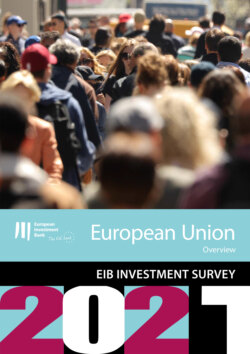Читать книгу EIB Investment Survey 2021 - European Union overview - Группа авторов - Страница 6
На сайте Литреса книга снята с продажи.
ОглавлениеInvestment dynamics and focus
INVESTMENT CYCLE AND EVOLUTION OF INVESTMENT EXPECTATIONS
Firms operating in the EU hold a positive outlook towards their future investment, bouncing back from low investment levels in 2020. In fact, a much larger share of firms — particularly large firms and those in the manufacturing sector — expect to increase rather than decrease their investment in 2021. This represents a substantial positive shift from EIBIS 2020, as investment expectations have bounced back to pre-EIBIS 2020 levels. The United States maintains a more positive investment outlook than the European Union. Within the European Union, with the exception of Malta, all EU countries hold a positive investment outlook.
‘Realised change’ is the share of firms who invested more minus those who invested less; ‘Expected change’ is the share of firms who expect(ed) to invest more minus those who expect(ed) to invest less.
Base: All firms
Share of firms investing shows the percentage of firms with investment per employee greater than EUR 500.
Base: All firms (excluding don’t know/refused responses)
INVESTMENT CYCLE AND EVOLUTION OF INVESTMENT EXPECTATIONS BY COUNTRY
Share of firms investing shows the percentage of firms with investment per employee greater than EUR 500. The y-axis line crosses the x-axis on the EU average for 2020.
Base: All firms (excluding don’t know/refused responses)
PURPOSE OF INVESTMENT IN LAST FINANCIAL YEAR (% of firms’ investment)
On average, firms across the European Union spent half of their investment on replacement in 2020, in line with EIBIS 2020 — ranging from 46% in the manufacturing sector to 57% in the construction sector. Investment in capacity expansion also accounted for a large proportion of total investment spent (25%). Investment in new products and services accounted for a lower share of the total expenditure (17%), particularly in the construction sector (9%).
The proportion of investment allocated to capacity expansion was highest in Latvia (38%) and lowest in Cyprus (13%); allocation for replacement was highest in France (61%) and lowest in Ireland (30%); and the share allocated to new products or services was highest in Ireland (29%) and lowest in Croatia (10%).
Q. What proportion of total investment was for (a) replacing capacity (including existing buildings, machinery, equipment, IT) (b) expanding capacity for existing products/services (c) developing or introducing new products, processes, services?
Base: All firms who have invested in the last financial year (excluding don’t know/ refused responses)
PURPOSE OF INVESTMENT IN LAST FINANCIAL YEAR BY COUNTRY (% of firms’ investment)
Q. What proportion of total investment was for (a) replacing capacity (including existing buildings, machinery, equipment, IT) (b) expanding capacity for existing products/services (c) developing or introducing new products, processes, services?
Base: All firms who have invested in the last financial year (excluding don’t know/ refused responses)
